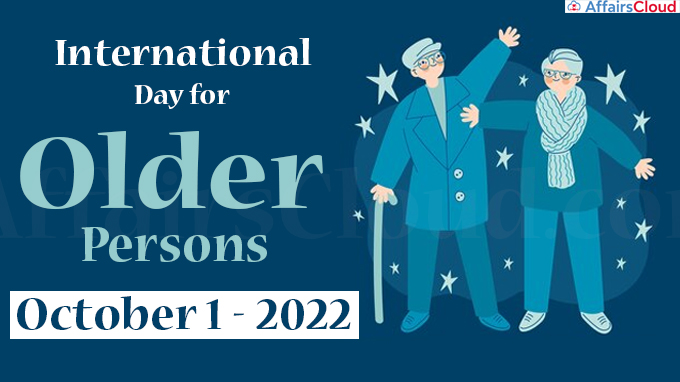
- 1st October 2022 marks the observance of the 32nd anniversary of the IDOP
The theme for the International Day of Older Persons 2022 is “Resilience of Older Persons in a Changing World.”
Objectives of IDOP2022:
- To highlight the resilience of older women in the face of environmental, social, economic and lifelong inequalities
- To raise awareness of the importance of improved worldwide data collection, disaggregated by age and gender
- To call on member states, UN entities, UN Women, and civil society to include older women in the center of all policies, ensuring gender equality as described in the Secretary-General’s report, Our Common Agenda
Background:
i.The United Nations General Assembly (UNGA) adopted the resolution A/RES/45/106 on 14th December 1990 and proclaimed October 1st of every year as the International Day of Older Persons.
- This was preceded by initiatives such as the Vienna International Plan of Action on Ageing, adopted by the 1982 World Assembly on Ageing and also endorsed by the UN General Assembly.
- The first ever International Day of Older Persons was observed on 1st October 1991.
ii.In 2002, the Second World Assembly on Ageing adopted the Madrid International Plan of Action on Ageing, to respond to the opportunities and challenges of population ageing.
The UN Decade of Healthy Ageing:
- The UN observed Decade of Healthy Ageing from 2021-2030.
- It is an opportunity to bring together governments, civil society, international agencies etc to improve the lives of older people, their families, and the communities in which they live.
Global data regarding ageing population:
i.According to the World Health Organization (WHO), in 2019 the number of people aged 60 years and older was 1 billion, this number will increase to 1.4 billion by 2030 and 2.1 billion by 2050.
ii.By 2030, 1 in 6 people in the world will be aged 60 years or over. This will accelerate in coming decades, particularly in developing countries and will have an impact on almost all aspects of society.
Population of Elders in India:
i.Elderly India Report-2021 states that, In 2021, Kerala has the maximum proportion of elderly people in its population(16.5%) followed by Tamil Nadu (13.6%), Himachal Pradesh (13.1%), Punjab (12.6%) and Andhra Pradesh (12.4%).
ii.Bihar (7.7%) followed by Uttar Pradesh (8.1%) and Assam (8.2%) has the least population of elderly.
Note-As per the 2031 projections with regard to the share of elderly people in the population Elderly India Report2021-.Kerala will be followed by Tamil Nadu (18.2%), Himachal Pradesh (17.1%), Andhra Pradesh (16.4%) and Punjab (16.2%)